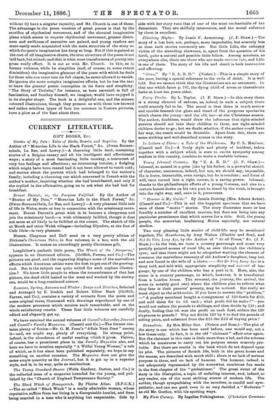Two very pleasing little stories of child-life may be mentioned
together, The Hawthorns, by Amy Walton (Blackie and Son), and Not So Very Long Ago, by the Author of "At all Times," Ao. (J. F. Shaw.)—In the first, we have a country parsonage and some very prettily painted scenes of rural life, as seen through the children's eyes; and that there might not be altogether wanting the element of romance, the marvellous recovery of old Andrew's daughter, long lost and now found in the wife of a clown.—Not So Very Long Ago is a story told, and told with appropriate simplicity and naiveté of lan- guage, by one of the children who has a part in it. Here, also, the scene is a country parsonage, to which, however, it is transferred from a London house. The removal, the journey, the arrival, the scene (a notably good one) where the children plan to relieve what they fear is their parents' poverty, may be noticed. But really we must object to the arithmetic. If you have to answer the "problem," —"A poultry merchant bought a consignment of 120 fowls for 2121 and sold them for 2a. 6d. each ; what profit did he make ?"—you would not reduce the pounds to shillings, and then divide by 120; and finally, finding that 6d. was the profit on each fowl, reduce the 120 sixpences to pounds ? Why not divide 120 by 8 to find the pounds of selling price, and enbstract from the 215 the 212 of buying price ?
















































 Previous page
Previous page